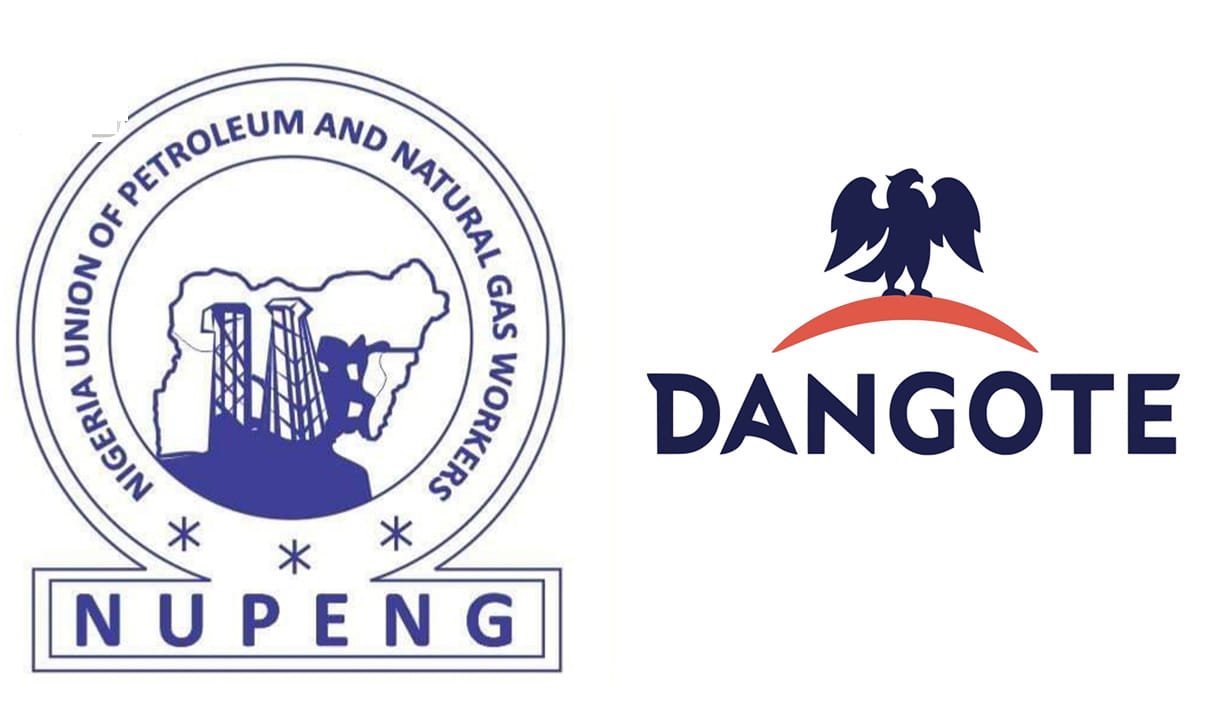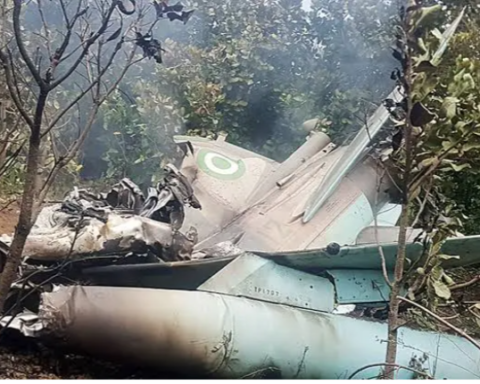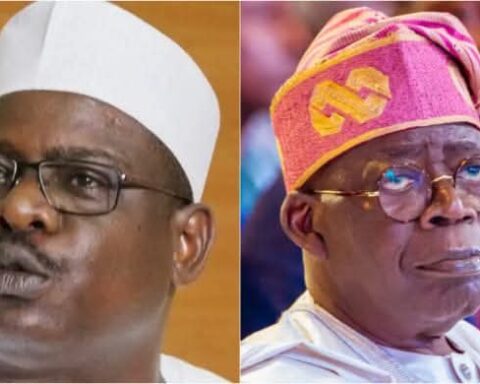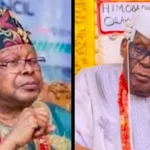The contention between Dangote Refinery and Petrochemicals and the Nigeria Union of Petroleum and Natural Gas Workers (NUPENG), over distribution of petroleum products and associated membership of NUPENG is shameful and embarrassing. The fracas underscores the gross failure in the system, a system that lacks the capacity to manage itself.

That NUPENG, the nation’s union of petroleum products truckers is contending with the one and only functional refinery over who should distribute petrol is laughable. If care is not taken, the contention could plunge the country into another round of fuel scarcity that would entail pain, suffering and return of long queues at petrol stations. To nip this in the bud, the Department of State Service (DSS) reportedly summoned the two parties to a parley to iron out the issues, even as NUPENG had threatened to resume strike.
According to reports, NUPENG accused Dangote Refinery of sponsoring division within its petroleum tanker driver’s branch and resisting workers’ rights to unionization. NUPENG also accused Dangote of using what it described as ’Greek gift’ of free nationwide petroleum delivery to undermine the union and stifle competition.
In a statement signed by NUPENG’s National Executive President, Williams Akporeha, and the General Secretary, Afolabi Olawale, NUPENG dismissed a press release by Dangote group as ‘an epitome of unconscionable capitalist falsehood aimed at hoodwinking Nigerians and crushing NUPENG”.
In a swift reaction to the accusations, the Dangote Group denied that it banned tanker drivers from joining the union, insisting that claims of anti labour practices, monopolistic behavior, and planned fuel price hike are “entirely unfounded’’.
Following that, NUPENG reportedly shutdown depots, protesting that the Dangote refinery did not allow the newly recruited drivers for its 4,000 compressed natural gas-powered trucks to join the union. However, the shutdown was promptly suspended following an agreement brokered by the Ministry of Labor and Employment. Thereafter, NUPENG said Dangote was not ready to abide by the terms of the agreement.
But the spokesman for the Dangote Group, Anthony Chiejina, in a statement made available to newsmen, stated that the allegation that it was undermining union activities and threatening worker’s welfare through its new deployment of CNG-powered trucks was not true. He reiterated that Dangote fully supports constitutionally protected labor rights, adding that employees are free to affiliate with any recognized trade union.
NUPENG reacted with more allegations. It claimed that Dangote Refinery instructed drivers to remove NUPENG stickers from their trucks and replace them with those of the newly created Direct Trucking Company Drivers Association (DTCDA), allegedly created by Dangote. “Our members have stoutly resisted this development”, it said. It accused the refinery of attempting to sponsor parallel structures within the PTD branch since 2023 by recruiting members who had lost union elections into the DTCDA.
That is the ugly situation in Nigeria’s petroleum sector–a back and forth tantrum between the country’s tanker union and the one and only functional private refinery. It is shameful that the contention is not over productivity but over consumption, over how to distribute the available petroleum products apparently produced by one private refinery. It is a shame.
As a major oil producer and OPEC member, Nigeria ought to have multiple functional refineries competing over productivity level. The issue of distribution ought to be taken for granted if the needed infrastructure were available. Whereas, other OPEC member countries are focusing on productivity, the contention in Nigeria is over how to consume the petrol the country could produce from, arguably, one private refinery. The contention is rife because of the abject infrastructural deficit. The standard modes of transporting petroleum products are lacking in Nigeria. The road tanker option appears to be the only available means of transporting the products in Nigeria.
Ideally, there are four modes of transporting petrol depending on several factors like distance, volume, safety, cost and environment considerations. It is absolutely wrong to have petrol transported by only the road (tanker) mode, as it’s the case in Nigeria. The following are the various modes of transporting petrol:
Pipelines: This mode is considered one of the safest and most efficient ways of transporting large volumes of petroleum products over long distances. It has advantage of lower cost per unit for high volumes, relatively safe with proper maintenance. However, it has high initial investment, prone to vandalism and sabotage in restive regions.
Tankers (road): Transporting petrol on road using tankers is widely used for distributing petrol to retail stations. It is apparently the most used mode in Nigeria. The over reliance on this mode is at the root of the contention between Dangote Refinery and NUPENG. There would have been no altercations if there were alternative modes of transportation for the products. Road transportation has the advantage of flexible routing to various destinations. The disadvantages however include safety risks, accidents, dilapidated roads, traffic congestions, etc.
Railway: Rail tankers are used in countries with developed and functional rail networks. It is cost effective for bulk cargo. The effective use of this mode depends on maintenance of the rail system.
Ships/Barges: This is used in coastal areas and for international transport. It is economical for large volumes over long distance. The disadvantage is that it is limited to navigable waters and also prone to spill and environmental contamination.
It is unfortunate that despite decades of stupendous oil wealth reaped by Nigeria, the country could not maintain basic transport infrastructures needed for the effective transportation of available oil products. The road infrastructure upon which petrol distribution depends is dilapidated. How many times have NUPENG embarked on strike to protest about the horrible highways?
The grouse of NUPENG is understandable. It wants all truck drivers to belong to the union to maintain the age-long statuesquo of dictating the tune in the name of trade unionism, whether or not it is in the national interest. Thus, they could embark on strike at will at the least provocation and hold the country to ransom.
The coming of Dangote Refinery ought to be seen as a blessing for a country that has suffered untold hardship from fuel scarcity and long queues at petrol stations. After decades of failure by the government to build modern refineries in the country, Alhaji Aliko Dangote broke a new dawn by building the Dangote Lekki Refinery as a private sector investment. Dangote represents a beacon of hope and inspiration in Nigeria.
The refinery has come as a big relief to Nigerians, who have borne the brunt of mismanagement of the country’s abundant oil resources. That Nigeria, until recently, the sixth largest oil producer in the world, has no public functional refineries is confounding.
By embarking on the refinery project, Dangote defied the lame argument that there is no profit in refinery business. Sadly enough, successive administrations in the country bought into the falsehood and held down any move in that direction
The other day, Alhaji Aliko Dangote announced that the nation’s 50 years battle with queues has ended, following one year of petrol production at the company’s 650,000 barrels per day facility.
The refinery has helped to stabilise petrol prices, with pump prices dropping from over N1,100 per liter before operation began to about N841 in many places in the southern parts of the country. The promise of free nationwide petroleum delivery is a positive development that should be lauded, for it would force pump price of petrol to go down further.
In view of the rising benefits of the Dangote Refinery, what the government should do is to provide the enabling environment for the refinery to operate optimally in the national interest. NUPENG should collaborate with Dangote Refinery rather than antagonize it against national interest.
Dr. Onyekakeyah, a former member of The Guardian Editorial Board, is a public affairs commentator and a Daily Query columnist.
Follow us on all social media platforms @dailyquery for news and analyses around the globe.



























